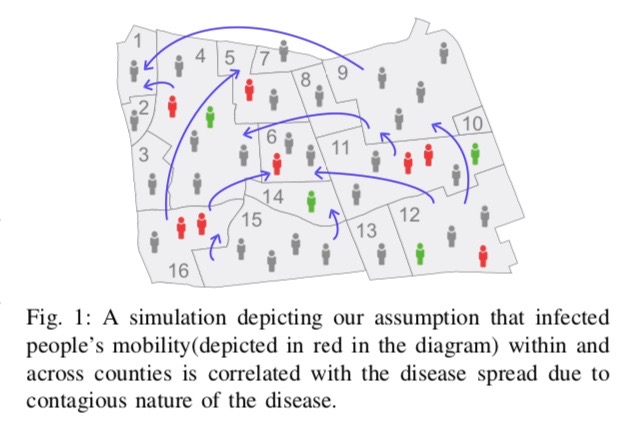Sanghani Center Student Spotlight: Shailik Sarkar

Growing up in a family that included a doctor and public sector employees, Ph.D. student Shailik Sarkar said it became increasingly evident to him that social, behavioral, and economic factors often influence the physical and mental health patterns of an individual or a group of people.
That realization shaped his own decision to focus his research in computer science on exploring how data mining and artificial intelligence can be used to tackle community healthcare problems.
A community level health outcome generally indicates overall health status of a group of people in a region, said Sarkar. “Anything from the cumulative number of people infected by COVID-19 to the number of people with asthma or the total number of deaths due to mental health conditions can be regarded as community level outcome of a certain physical or mental health issue. Analyzing how socioeconomic, linguistic, mobility, or any other features can be used to predict or identify those areas is something that is interesting to me,” he said.
Sarkar began his graduate studies at Virginia Tech as a master’s degree student having graduated with a bachelor of technology degree in computer science and engineering from Jalpaiguri Govt Engineering College, India (at the time affiliated with West Bengal University of Technology WBUT). But in Spring 2021, he converted to the Ph.D. program.
His advisor is Chang-Tien Lu and the opportunity to work with him in his Spatial Data Mining Lab is one of the things that attracted him to the university, Sarkar said.
“As a student at the Sanghani Center I have the chance to work with people from different backgrounds, each bringing their own unique perspective,” Sarkar said. “I like the center’s continuous drive towards tackling new problems and the singular focus towards exploring new research areas in artificial intelligence.”
Sarkar was part of the research team on the paper: “Deep diffusion-based forecasting of COVID-19 via incorporating network-level mobility information,” recently included in the proceedings of the 2021 IEEE/ACM International Conference on Advances in Social Networks Analysis and Mining (ASONAM). This paper was a collaboration between researchers at the Hume Center and the Sanghani Center.
Sarkar is also pursuing the National Science Foundation-sponsored Urban Computing certificate.
“What I learned from UrbComp has helped me massively in understanding how ubiquitous sources of data can be used to tackle the kinds of problems I am working on,” said Sarkar. “The program introduced to me topics like epidemiology, event detection, and several other challenge areas that AI and computer science in general can be used for.”
After earning his Ph.D., Sarkar would like to hold a position in either academia or industry where he can apply insights from his research in AI to real world solutions in healthcare.